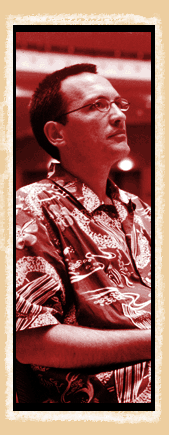Echoes of Old Worlds, Portents of New
by Bill McGlaughlin
![]() Yiddishbuk |
Yiddishbuk | ![]() Prayers of Isaac the Blind | Echoes of Old Worlds, Portents of New |
Prayers of Isaac the Blind | Echoes of Old Worlds, Portents of New |![]() Biographies
Biographies
When I think of ![]() Osvaldo Golijov, I see him in the recording studio at American Public Media, talking about his grandfather. We had just heard the St. Lawrence Quartet play his music and we sat there in the room, the six of us, trying to catch our breaths when Osvaldo began to speak.
Osvaldo Golijov, I see him in the recording studio at American Public Media, talking about his grandfather. We had just heard the St. Lawrence Quartet play his music and we sat there in the room, the six of us, trying to catch our breaths when Osvaldo began to speak.
 Osvaldo Golijov Photo:Michael Krasser |
|
He was a little boy, he said, when his grandfather came to live with him after losing the rest of his family - first his wife and then two of his children. They shared a room, and Osvaldo remembers waking early in the morning to find his grandfather standing next to the window, praying. As the little boy watched, the old man finished his prayers, put on his overalls and stepped out into the house, where he picked up a hammer and screwdriver and began to fix things - whatever small things in the house that needed looking after.
And when I think of Osvaldo, I also think of another old man from Argentina, Jorge Luis Borges, whom I heard reading his poems at the University of Minnesota twenty years ago. I say 'reading' his poems, but actually he was reciting them from memory. He had long before lost his sight. Borges would give us a poem and then sit with a beatific smile while a young professor gave us a translation into English. It was a lovely thing to see. Borges was hearing his secret inner world brought before us.
Somehow, Osvaldo Golijov reminds me of those two old men. They both constructed a world from what they had before them. In Borges' case, Argentine folklore - tales of Martin Fierro, the gaucho outlaw, of the porteños and porteñas of Buenos Aires. But Borges had another world, at once larger and more private. It came from his reading, and his taste was very much his own. Borges took particular delight in writers who inhabited special worlds of their own, just slightly off center - Poe, Kipling, Kafka. He seemed especially to enjoy the power of literature to ennoble the commonplace.
So, in his own way does Osvaldo Golijov. He inherited much from his family in Argentina - an intriguing combination of devout Judaism, which his mother brought from her native Romania, and atheistic socialism, courtesy of his father, who had emigrated from the Soviet Union. Into this add- classical piano lessons from Mom; a fascination with the tango in general and Astor Piazzolla in particular; experience with Klezmer and gypsy bands in Israel and Europe; study with composers George Crumb and Lukas Foss; later study of salsa and other Latin American and Cuban styles; interest in Brazilian music, especially that of the Bahia province-and you're on your way to understanding a little of what Osvaldo carries around in his head.
But there's a great deal you can't account for. That tally of musical influences I just listed might only add up to a gentleman who possesses an interesting record collection. Or a dilettante who cobbles together a patchwork made up of other people's music.
What is remarkable about Osvaldo Goljov is how naturally he has been able to create a body of work that acknowledges traditions and indeed, draws upon them for the emotional resonance they provide while forging a new and highly individual statement. I should also make plain that there is a great deal that is brand new in Golijov's music, qualities I have never heard anywhere before. Above all, I hear the sound of his voice.
No, I don't mean his speaking voice, I mean when he sings. A lot of composers sing to demonstrate a point, to show how they hope to hear a phrase. None of them sound like Osvaldo. His singing sounds like laughing and crying and praying, like a shaman invoking an ecstatic trance.
Now, when musicians look at Golijov's music, they may not see all that at first. Osvaldo started to be heard in the US in the early 1990s, when it seemed that all the young composers were in love with minimalism, which paradoxically means that they wrote a tremendous number of notes. Pages were black with sixteenth note patterns. (One can't help but note that this development arrived simultaneously with the use of computers to print music. And computers, of course, are very good at copying and pasting.)
Osvaldo's music didn't have so many notes. And it was hard to find the connections between them. Doing so took imagination and daring. Happily, Golijov has found extraordinary champions who discern the connections in his music and let us hear them - the Kronos and St. Lawrence quartets, soprano Dawn Upshaw, just to name a few.
Sitting next to Osvaldo in the American Public Media studio, listening to the St. Lawrence Quartet with Todd Palmer play the The Dreams and Prayers of Isaac the Blind, I sensed the power that comes from a composer finding his ideal interpreter - the way Verdi or Puccini must have felt knowing that Toscanini would conduct the premiere of a their new operas, or that Duke Ellington felt when he wrote an alto line for Johnny Hodges.
It's nearly impossible to put the sound of music into words, and I won't waste your time trying. Just listen. You'll find echoes of old worlds and portents of new. You'll get it. Just listen.








